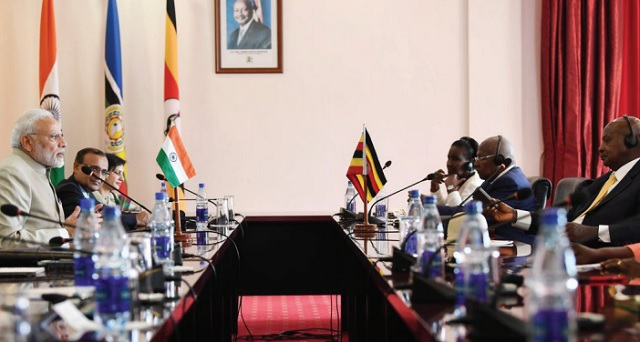
A tale of a bond sealed with blood
Kampala, Uganda | IAN KATUSIIME | When India’s Prime Minister Narendra Modi landed at Entebbe International Airport on July 24, very few Ugandans possibly recalled that he had been here before – in 2007.
The visit back then was the result of a tragic event which resulted in a strong bond of friendship between Modi and Uganda’s President Yoweri Museveni.
As Nimisha J. Madhvani, Uganda’s High Commissioner to United Arab Emirates, who was formerly posted to India, tells it, Modi and Museveni share a more than 10 year-old relationship. And it is an unfortunate incident in Uganda that ignited the relationship between the two leaders.
Nimisha told The Independent that the relationship of the two men goes way back to 2007 when riots over the proposed giveaway of part of the Mabira tropical rain forest to the Indian-owned sugar producing company resulted in the death of an Indian national in Kampala.
President Museveni had proposed to give away 7100 hectares of Mabira to Sugar Corporation of Uganda (SCOUL), which is owned by the Mehta family that originated from India. The young man was killed by an angry mob as he rode on a motorcycle in Kampala during the riots.
His killing led to tensions between Ugandans and the Indian community in the country. Following the strained relations between the two countries, Madhavni says Ruhakana Rugunda, then the Minister of Internal Affairs, led a delegation to India to extend an olive branch to the Indian government.
Other members of the delegation included Fred Beyendeza, then Acting High Commissioner to India, his deputy Nimisha Madhvani, Singh Katongole NRM Deputy Treasurer, then Tororo municipality MP Sanjay Tanna, Sanji Patel deputy head of the Indian association in Uganda, and Mukesh Tahkrar the MD of the company the slain Indian national worked for.
Madhvani says Rugunda’s delegation conveyed President Museveni’s apology to the Indian government, who included the Minister of Foreign Affairs. The delegation also assured the Indian government then led by Prime Minister Manmohan Singh, that the days of Idi Amin would not return to Uganda.
During the reign of Amin in Uganda, tens of thousands of Indians were expelled from Uganda in 1972 which threw many of them into a life of destitution although some of them, including the Madhivani family, prospered.
The Rugunda-delegation followed up with a visit to the state of the deceased Indian national, Gujarat, and were received by its then chief minister, Narendra Modi. The Ugandan delegation expressed their condolences and handed $10,000 to the bereaved family.
As a sign of improving relations between Uganda and India, Museveni invited Modi to Uganda and the chief minister honoured the invite in November 2007.
So, when Modi landed at Entebbe this time on July 24, it was literally the second coming.
Modi emerged from his plane at Entebbe International Airport at 2:20pm and was received by Sam Kutesa, Minister of Foreign Affairs.
He held talks with President Yoweri Museveni at State House Entebbe, addressed Parliament and met the Indian community at Kololo Independence Grounds during his two-day state visit to Uganda from July 24-25.
Museveni described Modi as “an old friend” and thanked him for the cooperation between the two countries. In a joint statement at State House, Museveni said he and Modi discussed mainly trade, tourism, and investment because the three enhance mutual prosperity. Museveni told the congregation that the trade imbalance between Uganda and India was reducing.
On tourism, the President revealed that Uganda Airlines is being revived and said the national carrier would fly directly to Bombay, a city in India, due to the many people he knows there. He said the many tourists flocking to Uganda would fill the country with dollars.
On investment, Museveni said India has pledged to invest in Uganda’s healthcare system since Ugandans go to “India a lot for medical treatment.”
 The Independent Uganda: You get the Truth we Pay the Price
The Independent Uganda: You get the Truth we Pay the Price



